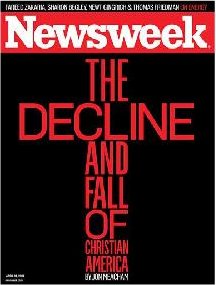Reaction to the 2009 American Religious Identification Survey (ARIS) have been equal parts glee and gloom. Results show a significant decline in the number of professing Christians, a marked increase in atheism, and a quest  for faith unrestricted by traditional boundaries. The Newsweek article, The End of Christian America, though written by an “an observant (if deeply flawed) Episcopalian,” echoes much of the secular sentiment:
for faith unrestricted by traditional boundaries. The Newsweek article, The End of Christian America, though written by an “an observant (if deeply flawed) Episcopalian,” echoes much of the secular sentiment:
While we remain a nation decisively shaped by religious faith, our politics and our culture are, in the main, less influenced by movements and arguments of an explicitly Christian character than they were even five years ago. I think this is a good thing—good for our political culture, which, as the American Founders saw, is complex and charged enough without attempting to compel or coerce religious belief or observance. It is good for Christianity, too, in that many Christians are rediscovering the virtues of a separation of church and state… As crucial as religion has been and is to the life of the nation, America’s unifying force has never been a specific faith, but a commitment to freedom—not least freedom of conscience. At our best, we single religion out for neither particular help nor particular harm; we have historically treated faith-based arguments as one element among many in the republican sphere of debate and decision. The decline and fall of the modern religious right’s notion of a Christian America creates a calmer political environment and, for many believers, may help open the way for a more theologically serious religious life. (emphasis mine)
While the author suggests the decline of a Christian presence will lead to less political entanglements and healthier religious discourse, others believe it signals a dangerous theological erosion and cultural disconnect. We are entering the Laodicean age, they say, the age of spiritual lukewarmness, harbinger of the Apocalypse.
But as much as religious leaders have been bemoaning these statistical findings, I think there may be an upside to the apparent decline of Christianity in America.
For the longest time, America has been portrayed as being “a Christian nation.” But what does that mean? Yes, most Americans believe in God. Yes, our founders embraced and were driven by profoundly religious concepts. Yes, there are more churches in the U.S. than any other nation. However, the statistics do not capture the biblical distinctives of what it means to actually be a Christian. Just because someone calls themselves a Christian does not make them one. In fact, Jesus warned that many who consider themselves eligible for heaven will be turned away (Matt. 7:21-23). Church attendance and/or affiliation does not make one a Christian. Religious duty and charitable giving does not make one a Christian. Mental assent does not make one a Christian. Salvation occurs on a much deeper, perhaps less quatifiable, level. It is this lack of biblical nuance, discernment, and specificity that hinders findings like those of ARIS.
America is a Christian nation only to the degree that those who call themselves Christians really are. But if the statistics are any indication, the figures are inflated. Divorce, crime, corruption, greed, scandal, immorality, abortion, addiction, obesity — is this the stuff of a Christian nation? It makes one wonder how christian Christian America really is.
The exposure of unorthodox, fence-straddling, casual religious practitioners may, in the long run, be a good thing. Christ was not shy about thinning the ranks and exposing marginal believers. After His infamous “eat My flesh and drink My blood” sermon (Jn. 6), Scripture says that “many of His disciples went back and walked with Him no more” (vs. 66). Jesus purposely set the bar high to weed out the half-hearted. Apparently, Christ would not sacrifice quality for quantity; He would rather have a small band of committed followers, than a large group of apathetic ones.
Likewise, in the long run, less Christians (i.e. posers, self-deceived, rewrite-the-rules religious folk) may be better for America. Of course, Jesus wants us to spread the Gospel and make more disciples. But what Gospel are we spreading? Are we more interested in numbers or the vitality of faith? And are we sacrificing the “hard sayings of Jesus” at the altar of church growth? If John 6 is any indication, one evidence that the true Gospel is being preached could be a decline in church membership.
Of course, the ARIS data may be a harbinger of the Church’s demise. However, it may also indicate that the bloated statistics regarding Christian America are finally coming down to earth. In the long run, the Church is better off having less real believers, than having more fake ones.















I wonder if this “decline” is not so much an erosion of Christendom in America as evidence of an apprehension of the true values sustaining our fair country: rabid individualism and consumerism. Separating these cultural infiltrations that have so long plagued the Western religion called “Christianity” from true Christianity is fine in my book. As our faith increasingly contrasts with the controlling system, the truth and hope of a different Way will be thrown into sharper relief. If that requires that Americans and Christians no longer be considered synonymous (and I think it should), then so be it. Let us be good followers of Christ and not quintessentially American, if being an American means (as it does these days) being a worshiper at the altar of power, capitalism, and entertainment.
“lukewarm”
yes.
excellent post, Mike.
i’ve discovered many things about the church these last several years of my journey, and you sum them up well, here.
my love for the church has not changed, but how i view the american church certainly has. and perhaps, that’s not so much a bad thing as much as it’s a clearer view of reality.